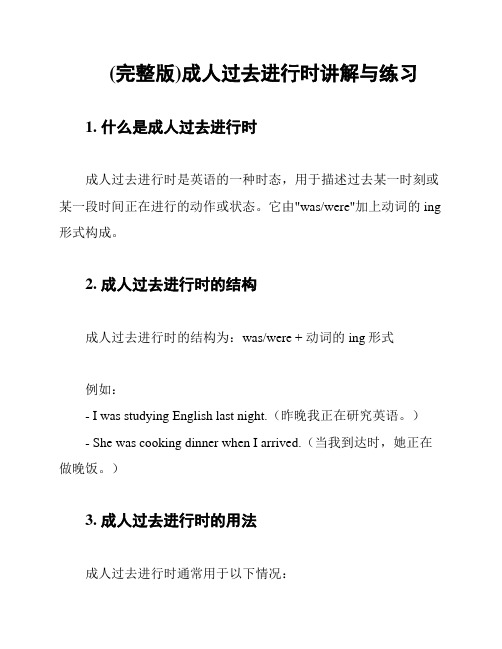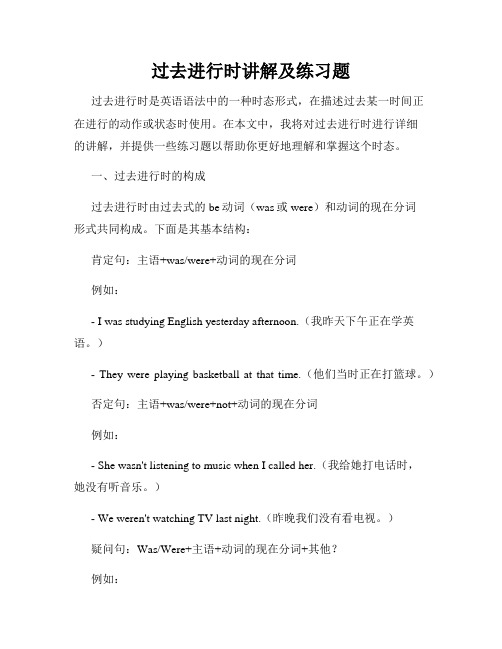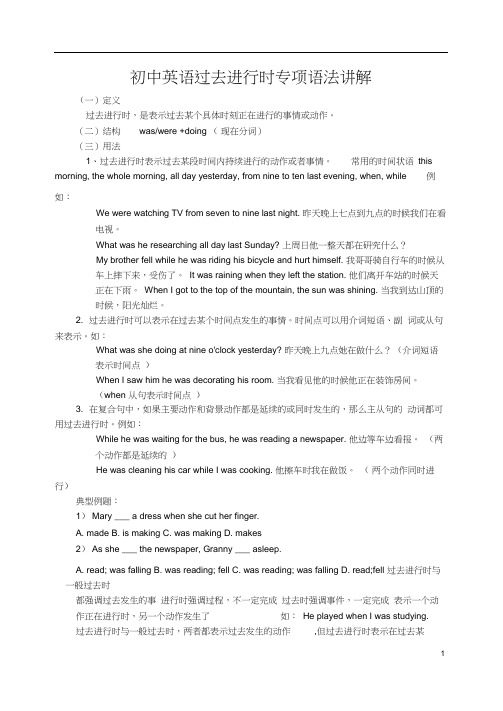过去进行时讲解及习题
过去进行时 详细讲解及配套练习(24张)

Before the English class on Monday.
What are they drawing?
It is now Wednesday. Do you remember what was happening before the English class?
What was Li Lei doing when the teacher came in?
Lin Tao
Kate
Exercise 补全对话: A: What evening? B: I some chalk. you doing at 8 o’clock yesterday a pa your mother see it?
B: Yes. She saw it and said, “It’s quite a nice panda.”
(1) 过去进行时强调动作在过去某时刻正在进行或持续, 而一般过去时表示动作的完成。如: He was writing his composition last night. 他昨晚在写作 文。(不一定写完) He wrote his composition last night. 他昨晚写了一篇作 文。(已经写完)
一 用所给动词的适当形式填空 1)What ______ you ________ (do) at noon yesterday? 2)I ______________(watch) TV when my mother_____ (come) in 3) He ___________(do) his lessons at ten yesterday morning. 4) The children ______________(play) football at four yesterday afternoon. 5) The baby _______________ (sleep) when the mother came back. 6) My mother came in while I _____________(watch) TV 7) I didn’t know what he ____________ yesterday morning when I called him.
(完整版)成人过去进行时讲解与练习

(完整版)成人过去进行时讲解与练习1. 什么是成人过去进行时成人过去进行时是英语的一种时态,用于描述过去某一时刻或某一段时间正在进行的动作或状态。
它由"was/were"加上动词的ing 形式构成。
2. 成人过去进行时的结构成人过去进行时的结构为:was/were + 动词的ing形式例如:- I was studying English last night.(昨晚我正在研究英语。
)- She was cooking dinner when I arrived.(当我到达时,她正在做晚饭。
)3. 成人过去进行时的用法成人过去进行时通常用于以下情况:- 描述过去某一时刻或某一段时间正在进行的动作或状态。
- 描述过去某一时刻正在进行,但被打断的动作或状态。
例如:- They were playing soccer when it started to rain.(开始下雨时,他们正在玩足球。
)- I was reading a book when the phone rang.(电话响时,我正在看书。
)4. 成人过去进行时的练请根据句意和提示写出符合语境的正确句子。
1. He (watch) TV when I (arrive).2. They (have) dinner when the power (go) out.3. She (listen) to music while she (clean) the house.4. We (play) basketball when it (start) raining.5. I (read) a book when my friend (call) me.参考答案:1. He was watching TV when I arrived.(我到达时,他正在看电视。
)2. They were having dinner when the power went out.(停电时,他们正在吃晚饭。
英语语法过去进行时讲解与习题

过去进行时讲解与习题过去进行时是表示过去某一时刻或某一时间内正在进行或发生的动作。
可以从两个方面来理解: 1 过去某一时刻正在进行或发生的动作。
They were playing football at ten o’clock yesterday morning. My mother was cooking when I got home. I was washing my clothes at this time yesterday. 2 过去某阶段持续进行的动作What were you doing during the holiday? 另外,在复合句中,若主要动作和背景动作是同时发生的,那么主从句都可用过去进行时Jenny was reading while Danny was writing.其结构是助动词be的过去形式was/were +v-ing.其句式变化仍然要在be上做文章。
We were working in class.We weren’t working in class.Were you working in class?过去进行时常与过去某一特定时间的状语连用,如last night, at that time, at noon yesterday, last Sunday 等。
也有时没有时间状语,要通过上下文的暗示来确定用过去进行时。
The students all worked hard. Everyone knew what he was working for.1.过去进行时的构成过去进行时是由“was / were +现在分词”构成的。
I was doing my homework at this time yesterday.昨天的这个时候我正在做作业。
Were you expecting him yesterday?你昨天一直在等他吗?They were not talking when I came in.我进来的时候他们没在说话。
英语中过去进行时的总结与练习题

英语中过去进行时的总结与练习题一、过去进行时的总结过去进行时是一种表示过去某个时间点或某个时间段内正在进行的动作的时态。
它常常与表示过去的时间状语连用,如“yesterday”, “last night”, “at that time”等。
过去进行时的基本结构是“was/were + 现在分词”。
1. 用途与功能•描述过去某个时刻正在进行的动作或状态。
•与过去某个时刻的短暂动作或状态进行对比。
•与一般过去时连用,表示两个过去动作同时发生。
2. 构成方式•主语为第三人称单数时,使用“was + 现在分词”。
•主语为其他形式时,使用“were + 现在分词”。
3. 与其他时态的区别•与一般过去时相比,过去进行时强调动作在过去的某个时间点或时间段内正在进行,而一般过去时则强调动作的完成或结束。
•与现在进行时相比,过去进行时描述的是过去的情景,而现在进行时描述的是现在的情景。
4. 常见的时间状语•at that time•at noon•at midnight•this morning/afternoon/evening•yesterday•last night•when, while引导的时间状语从句二、练习题选择题1.When I ______ my homework, my sister ______ TV.A. did; watchedB. was doing; was watchingC. was doing; watchedD. did; was watching2.They ______ a football match from 7 to 9 last night.A. watchedB. are watchingC. were watchingD. watch3.What ______ you ______ at 8 o’clock last night?A. did; doB. were; doingC. are; doingD. do; do4.It was raining hard. They ______ just ______ their umbrellas.A. had; leftB. have; leftC. had; been leavingD. were; leaving5.We ______ a film at 8 last night when the power cut off.A. watchedB. are watchingC. were watchingD. had watched填空题1.I ______ (cook) dinner when the phone rang.st night, they ______ (play) cards when I ______ (arrive) home.3.While the teacher ______ (explain) the text, the students ______ (take) notes.4.We ______ (have) a meeting from 2 to 4 yesterday afternoon.5.When I ______ (get) to the station, the train ______ (leave).翻译题1.昨天晚上8点,我正在做作业,而我的弟弟正在看电视。
(word完整版)仁爱八年级过去进行时用法精讲及其练习

仁爱八年级过去进行时用法精讲及其练习一、构成:1) 肯定形式:S +was/were+动词的现在分词v.ing.2) 否定形式:S + was/were+ not+动词现在分词v.ing.3) 疑问形式:Was/Were +S+动词现在分词v.ing.二、用法:1)表示过去某一时刻或过去一段时间内正在进行的动作。
常和表示过去的时间状语then, at that time, this time yesterday, at ten yesterday等连用,或用另一动作来表示过去的时间。
如:---What were you doing at nine last night?---I was watching TV at that time.He was reading when I came in.2)在when, while引导的时间状语从句的主从复合句中过去进行时的运用:.动作持续时间长,用过去进行时,持续时间短,用一般过去时c.动作不分长短,同时使用过去进行时,此时时间状语一般用while引导。
The students were reading books, when the teacher came in.My mum called when I was doing my homework.I was singing while Xiaohong was dancing.一、单选1 What ______ from three to four yesterday afternoon?A have you doneB had you doneC did you doD were you doing2 – I call you yesterday evening, but there was no answer.- Oh., I’m sorry I _____ dinner at my friend’s home.A homeB hadC was havingD have had3 My mother _____ while my father _____TV.A cooked; was watchingB was cooking; was watchingC was cooked; watchedD cooked; watched4 When I got home, my son _____ the music.A am listening toB listened toC was listening toD was listening5 We heard a cry when we ______ TV last night.A were watchingB would watchC watchD watched6 10 Nobody noticed what she ______ at the moment.A will doB was doingC has doneD had done7 Was it raining hard when you _____ this morning?A leftB leavesC was leavingD would leave8 The teacher ______ when I came into the classroom.A is drawingB drawsC has drawnD was drawing9 The pizza ______ by my mother. Would you like to have some?A makesB was makingC madeD was made二、填空1 ______ they______ (feed) the animals at 5:00 yesterday afternoon?2 Mrs. Green _____ _____ (not wash) clothes at this time yesterday.3 Grandpa ______ ______ (mend) his clock when I reached home.4 As I _____ (walk) in the park, I saw some children playing games.。
现在进行时和过去进行时讲解和练习题

三、现在分词的构成:(1)一般在动词末尾直接加ing,(2)以不发音字母e结尾的动词,先去掉e,再加ing,如make →making dance → dancing跳舞write → writing写have → having ride → riding 骑come → coming来四、现在进行时的基本用法:(1) 表示现在( 指说话人说话时) 正在发生的事情。
We are waiting for you.(2) 习惯进行:表示长期的或重复性的动作,说话时动作未必正在进行。
Mr. Green is writing another novel.(说话时并未在写,只处于写作的状态。
)She is learning piano under Mr. Smith.(3) 表示渐变的动词有:get, grow, become, turn, run, go, begin等。
The leaves are turning red.It's getting warmer and warmer.(4) 与always, constantly, forever 等词连用,表示反复发生的动作或持续存在的状态,往往带有说话人的主观色彩。
You are always changing your mind.(责备)(5)表示最近按计划或安排要进行的动作,如常与表示将来的时间状语连用,常用的动词有come,go,leave, start, arrive, have 等,如: He is leaving for Nanjing this evening,他今晚动身去南京。
We are having a holiday next Monday,我们下星期一放假。
五、不用进行时的动词1.感官动词不用于进行时态这些词有see,hear,smell,taste,feel,如:The cake smells good,那块蛋糕闻起来味道很好。
过去进行时讲解及练习题

过去进行时讲解及练习题过去进行时是英语语法中的一种时态形式,在描述过去某一时间正在进行的动作或状态时使用。
在本文中,我将对过去进行时进行详细的讲解,并提供一些练习题以帮助你更好地理解和掌握这个时态。
一、过去进行时的构成过去进行时由过去式的be动词(was或were)和动词的现在分词形式共同构成。
下面是其基本结构:肯定句:主语+was/were+动词的现在分词例如:- I was studying English yesterday afternoon.(我昨天下午正在学英语。
)- They were playing basketball at that time.(他们当时正在打篮球。
)否定句:主语+was/were+not+动词的现在分词例如:- She wasn't listening to music when I called her.(我给她打电话时,她没有听音乐。
)- We weren't watching TV last night.(昨晚我们没有看电视。
)疑问句:Was/Were+主语+动词的现在分词+其他?例如:- Were you sleeping when the phone rang?(电话响时你正在睡觉吗?)- Was he working in the office yesterday?(他昨天在办公室工作吗?)二、过去进行时的用法1. 描述过去某一时刻正在进行的动作或状态。
例如:- She was cooking dinner at 7 o'clock last night.(她昨晚7点钟正在做晚饭。
)- They were talking about the movie when I entered the room.(当我进入房间时,他们正在谈论电影。
)2. 表示过去某段时间内反复或持续的动作或状态。
例如:- I was reading a book all afternoon.(整个下午我一直在读书。
初中英语过去进行时专项语法讲解及练习题

初中英语过去进行时专项语法讲解(一)定义过去进行时,是表示过去某个具体时刻正在进行的事情或动作。
(二)结构was/were +doing (现在分词)(三)用法1、过去进行时表示过去某段时间内持续进行的动作或者事情。
常用的时间状语this morning, the whole morning, all day yesterday, from nine to ten last evening, when, while 例如:We were watching TV from seven to nine last night. 昨天晚上七点到九点的时候我们在看电视。
What was he researching all day last Sunday? 上周日他一整天都在研究什么?My brother fell while he was riding his bicycle and hurt himself. 我哥哥骑自行车的时候从车上摔下来,受伤了。
It was raining when they left the station. 他们离开车站的时候天正在下雨。
When I got to the top of the mountain, the sun was shining. 当我到达山顶的时候,阳光灿烂。
2. 过去进行时可以表示在过去某个时间点发生的事情。
时间点可以用介词短语、副词或从句来表示。
如:What was she doing at nine o'clock yesterday? 昨天晚上九点她在做什么?(介词短语表示时间点)When I saw him he was decorating his room. 当我看见他的时候他正在装饰房间。
(when 从句表示时间点)3. 在复合句中,如果主要动作和背景动作都是延续的或同时发生的,那么主从句的动词都可用过去进行时。
例如:While he was waiting for the bus, he was reading a newspaper. 他边等车边看报。
- 1、下载文档前请自行甄别文档内容的完整性,平台不提供额外的编辑、内容补充、找答案等附加服务。
- 2、"仅部分预览"的文档,不可在线预览部分如存在完整性等问题,可反馈申请退款(可完整预览的文档不适用该条件!)。
- 3、如文档侵犯您的权益,请联系客服反馈,我们会尽快为您处理(人工客服工作时间:9:00-18:30)。
过去进行时讲解与习题1.概念过去进行时是表示过去某一时刻或某一时间内正在进行或发生的动作,可以从两个方面来理解:1 过去某一时刻正在进行或发生的动作。
如: They were playing football at ten o’clock yesterday morning.My mother was cooking when I got home.I was washing my clothes at this time yesterday.2 过去某阶段持续进行的动作。
如:I was staying at home last weekend.常与过去某一特定的时间状语连用,如last night, at that time, at 8:00yesterday, last Sunday , at this time yesterday, from 7 to 9 last night等。
也有时没有时间状语,要通过上下文的暗示来确定用过去进行时。
E.g. The students all worked hard. Everyone knew what he was working for.另外,也可用于when/while引导的时间状语从句中。
但在复合句中,若主要动作和背景动作是同时发生的,那么主从句都可用过去进行时。
如:It was raining when they left the hospital.Jenny was reading while Danny was writing.2.句型结构⑴肯定句:主语 + was/were + 动词现在分词(doing) + 其他.如:I was playing basketball at 6:30 yesterday.He was playing the piano at that moment.They were doing homework at 8:00 last night⑵否定句:主语 + was/were + not + 动词现在分词(doing) + 其他如: I was not playing basketball at 6:30 yesterday.He wasn’t playing the piano at that moment.They weren’t doing homework at 8:00 last night.⑶一般疑问句: Was/Were + 主语 + 动词现在分词(doing) + 其他?如: Were you playing basketball at 6:30 yestetday?---Yes, I was./No, I wasn’t.Was he playing the piano at that moment?---Yes, he was./No, he wasn’t.⑷特殊疑问句:特殊疑问词 + 一般疑问句?如: What were you doing at 8:00pm yesterday?Where was he working at that time?注:其句式变化仍然要在be上做文章练习㈠用所给动词的正确形式填空。
1.Jim _____(write) a letter at that moment.2.When the telephone_______(ring),she ______(do) her homework.3.When I ______(leave) the part,the people ______(enjoy) themselves.4.______ they______ (feed) the animals at 5:00 yesterday afternoon?5. Mrs.Green _____ _____ (not wash) clothes at this time yesterday.6. Grandpa ______ ______ (mend) his clock when I reached home.7.As I _____ (walk) in the park, I saw some children playing games.㈡、单选1 What ______ from three to four yesterday afternoon?A have you doneB had you doneC did you doD were you doing2 – I call you yesterday evening, but there was no answer.- Oh., I’m sorry I _____ dinner at my friend’s home.A homeB hadC was havingD have had3 My mother _____ while my father_____TV.A cooked; was watchingB was cooking; was watchingC was cooked; watchedD cooked; watched4 When I got home, my son _____ the music.A am listening toB listened toC was listening toD was listening5 We heard a cry when we ______ TV last night.A were watchingB would watchC watchD watched6 Could you tell me when ______?A she is comingB she was comingC will be comeD is he coming7 The teacher ______ when I came into the classroom.A is drawingB drawsC has drawnD was drawing8 Nobody noticed what she ______ at the moment.A will doB was doingC has doneD had done9 Was it raining hard when you _____ this morning?A leftB leavesC was leavingD would leave现在完成时讲解与习题1.概念⑴表示过去发生的动作对现在的影响和结果依然存在(已完成)。
常与副词already(肯定),yet(否定,疑问),just,ever,never,once,twice,befoe等连用。
如: We have already known each other.I have just washed my face.He has been to this island before.⑵也表示过去发生的动作或状态一直持续到现在,且有可能继续下去(未完成)。
常与for(+时间段),since(+时间点或过去时的句子),so far等表示一段时间的状语连用。
如:如: We have lived there since 2000.Mr.zhang has been in Beijing for over thirty years.He has learned English since he was 6 years old.注:这种用法中的动词用延续性动词。
非延续性动词要用延续性动词代替。
常见非延续性动词与延续性动词的转换:buy—have borrow—keep come—be hereleave/go—be away begin/start—be on die—be dead join—be in如:I have kept(borrow) the book for two weeks.She has had(buy) this bike for a year.The old man has been dead(die) since last year.They have been away(leave) for two hours.2.句型结构⑴肯定句:主语 + have/has + 动词过去分词 + 其他。
(主语是第三人称单数时用has,其他人称用have)。
如:I have done my homework since6:00.They have found the lost boy.She has gone to Beijing since she was 16 years old.⑵否定句:主语 + have/has + not + 动词过去分词 + 其他。
如: They have worked for 20 hours.→They haven’t worded for 20 hours.He has had hisbreakfast.→He hasn’t had his breakfast.⑶一般疑问句: Have/Has + 主语 + 动词过去分词 + 其他?如:She has been to Beijing.→Has she been to Beijing?---Yes,she has./No,she hasn’t.They have already learned threeEnglish songs.→Have theylearned three English songsyet?---Yes,they have./No,they haven’t.⑷特殊疑问句:特殊疑问词 + 一般疑问句?如: How many words has he learnedyet?How long hawe you lived here?注:have/has been to 表示“去过某地”(已回来).瞬间动词形式have/has gone to 表示“去某地了”(还未回来)人不在说话处,主语常用第三人称。
Have/has been in 表示“已经。
”(持续的).持续性动词形式3.过去分词变化规则⑴规则动词过去分词同过去式。
⑵不规则动词需要记忆。
① AAA型1) cost—cost—cost 2) cut—cut—cut 3) hit—hit—hit4) hurt—hurt—hurt 5) let—let—let 6) put—put—put7) read—read—read 8) set—set—set 9) shut—shut—shut②AAB型1) beat—beat—beaten③ ABA型1) become—became—become 2) come—came—come 3) run—ran—run④ABB型1) bring—brought—brought 2) buy—bought—bought 3) think—thought—thought4) catch—caught—caught 5) teach—taught—taught 6) build—built—built7) lend—lent—lent 8) send—sent—sent 9) spend—spent—spent10) lose—lost—lost 11) smell—smelt—smelt 12) burn—burnt—burnt13) feel—felt—felt 14) learn—learnt—learnt 15) hear—heard—heard16) mean—meant—meant 17) keep—kept—kept 18) sleep—slept—slept19) sweep—swept—swept 20) tell—told—told 21) stand—stood—stood22) understand—understood—understood 23) say—said—said24) pay—paid—paid 25) meet—met—met 26) leave—left—left27) hold—held—held 28) dig—dug—dug 29) find—found—found30) get—got—got31) hang—hung—hung 32) have—had—had33) make—made—made 34) shine—shone—shone 35) sit—sat—sat36) win—won—won⑤ABC型1) blow—blew—blown 2) draw—drew—drawn 3)fly—flew—flown4) grow—grew—grown 5) throw—threw—thrown 6) know—knew—known7) choose—chose—chosen 8) eat—ate—eaten 9)fall—fell—fallen10) ride—rode—ridden 11) rise—rose—risen 12) hide—hid—hidden13) see—saw—seen 14) shake—shook—shaken 15) take—took—taken16) mistake—mistook—mistaken17) wake—woke—waken18) write—wrote—written 19) be—was/were—been 20) do—did—done21) break—broke—broken 22) forget—forgot—forgotten 23) give—gave—given24) freeze—froze—frozen 25) begin—began—begun 26) ring—rang—rung27) drink—drank—drunk 28) go—went—gone 29) lie—lay—lain30) sing—sang—sung 31) swim—swam—swum 32) wear—wore—worn33) show—showed—shown 34) sink—sank—sunk练习:A.用所给词的适当形式填空。
